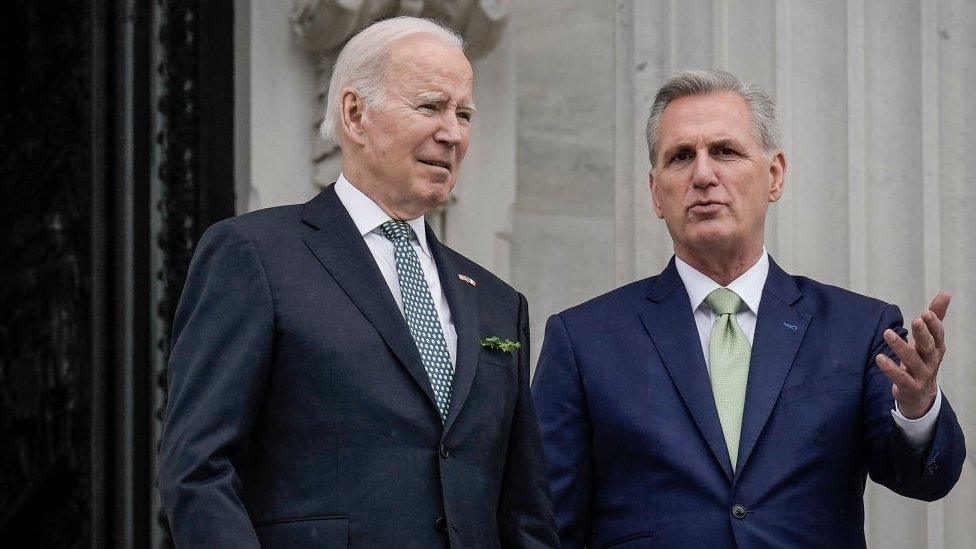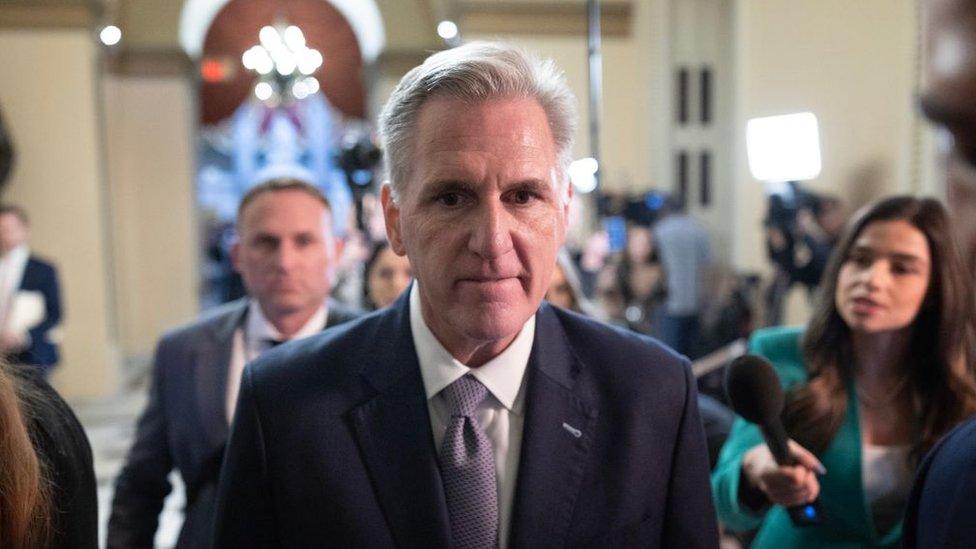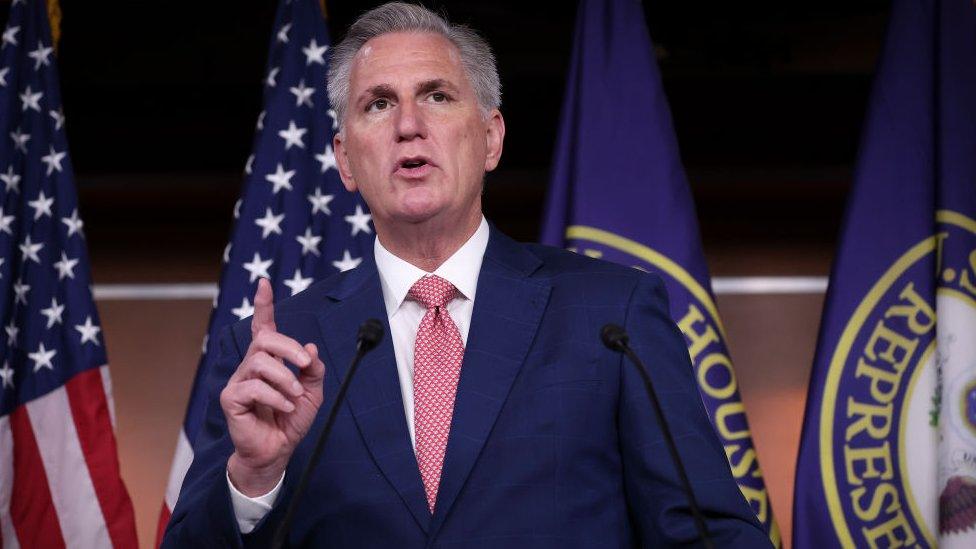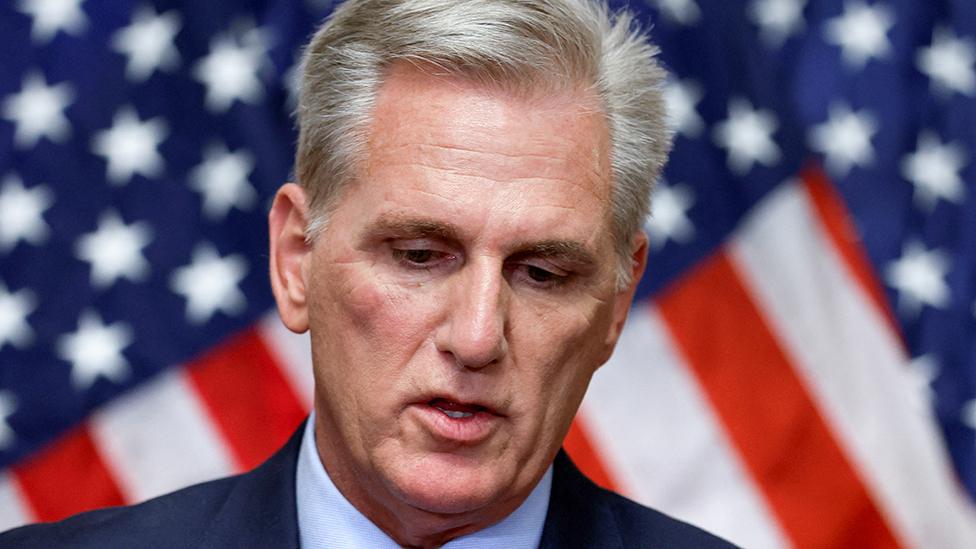Three ways the Kevin McCarthy drama could end ahead of speaker vote
- Published
Watch: A timeline of the McCarthy-Gaetz feud
Speaker of the US House Kevin McCarthy's job is on the line - and he may need the help of the Democratic opposition to keep it.
That is the conundrum facing the man who was elected, after four days and 15 rounds of balloting, to run the Republican-controlled lower chamber of Congress at the beginning of the year.
As part of the deal that ultimately won Mr McCarthy enough support to claim the speaker's gavel, he agreed to give reluctant hard-line conservatives an easy means to force a vote to oust him whenever they chose.
On Monday night, one of the speaker's chief right-wing antagonists, Rep Matt Gaetz of Florida, dropped the hammer, trigging a vote on Mr McCarthys' fate.
There are three possible outcomes:
Kevin McCarthy holds onto his job - without help from the Democrats
Sometime in the next few days - perhaps as early as Tuesday afternoon - the House will consider Mr Gaetz's effort to remove Mr McCarthy. In Congress-speak, it's a "motion to vacate the chair".

Mr McCarthy is keen to avoid relying on the support of President Joe Biden's Democrats to keep his job
The speaker's allies may try to scuttle the motion ahead of a formal vote, but whether it is one vote or a series of votes the bottom line is the same. Mr McCarthy needs the support of a majority of the voting members of the House of Representatives in order to hang on to power.
If Republicans stick together in supporting Mr McCarthy, they could dispense with the drama and keep their man in power.
The Republicans currently have a 221 to 212 majority in the House, so assuming every member casts a vote, Mr McCarthy would be able to survive just with Republican support if all but four of his party back him.
Kevin McCarthy holds onto his job - with Democratic help
The problem for Mr McCarthy is that five House Republicans - including Mr Gaetz - have said publicly that they will vote to oust the speaker. And there are up to a dozen or so more who may join this band of conservative rebels.
So unless some of them change their mind, the speaker is going to need some help from Democrats to avoid losing his job. That help could come in several different ways.

Rep Matt Gaetz, long an arch-critic of Mr McCarthy, has led the charge to oust him as speaker
At least a handful of Democrats could vote against the motion to vacate, giving the speaker a majority of support despite Republican defections. While many Democrats have expressed no interest in saving the skin of a man who has worked to block their agenda and has launched an impeachment investigation of their president, some centrists could view this as a way of burnishing their bipartisan credentials.
Democrats could also simply choose not to vote - or vote "present" - which would lower the number of votes Mr McCarthy would need to achieve majority support.
There would be political consequences from this outcome, however. Democrats could extract some concessions from Mr McCarthy in exchange for throwing him a lifeline. And even if they didn't, Mr Gaetz and his right-wing cadre would cite the vote as evidence that the speaker is insufficiently conservative and is beholden to members of the opposition party - and could bring another vote to oust Mr McCarthy at a future date.
Kevin McCarthy is ousted - for now
If Mr McCarthy loses the removal motion, it triggers a new election for Speaker of the House. A temporary speaker (from a list privately provided by Mr McCarthy earlier this year) takes control of the chamber, and the balloting drama from the beginning of the year starts all over again.
Democrats will probably back minority leader Hakeem Jeffries. Many Republicans could stick with Mr McCarthy, if he chooses to run again. A different Republican candidate could emerge from the chaos.
Whoever wins a majority of support of the chamber is elected speaker in a process that could drag on for days.
In the meantime, the clock would be ticking toward 17 November, when the US government once again threatens to shut down if Congress does not act to keep it funded.
Watch: Gaetz files bid to oust House Speaker McCarthy
Related topics
- Published2 October 2023

- Published1 October 2023

- Published4 October 2023
